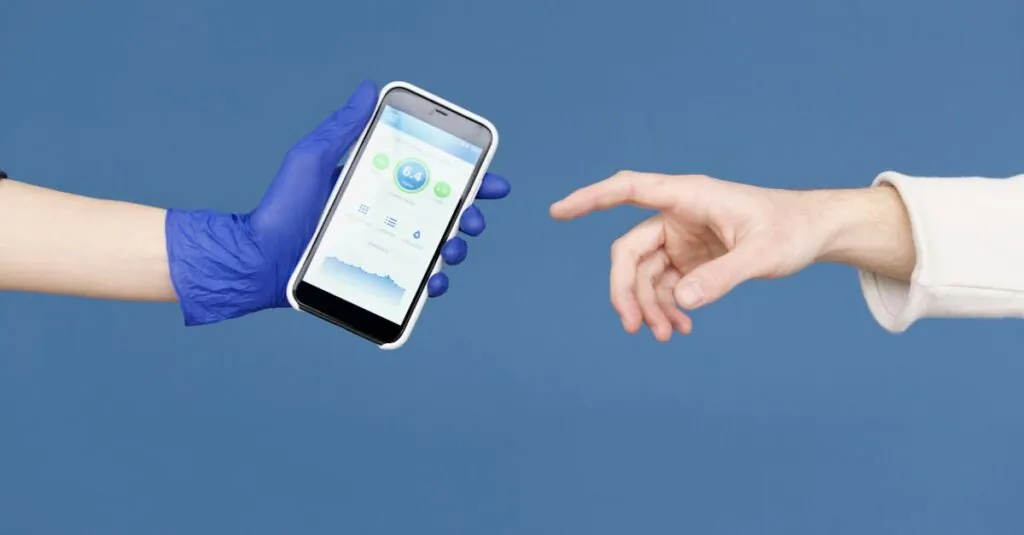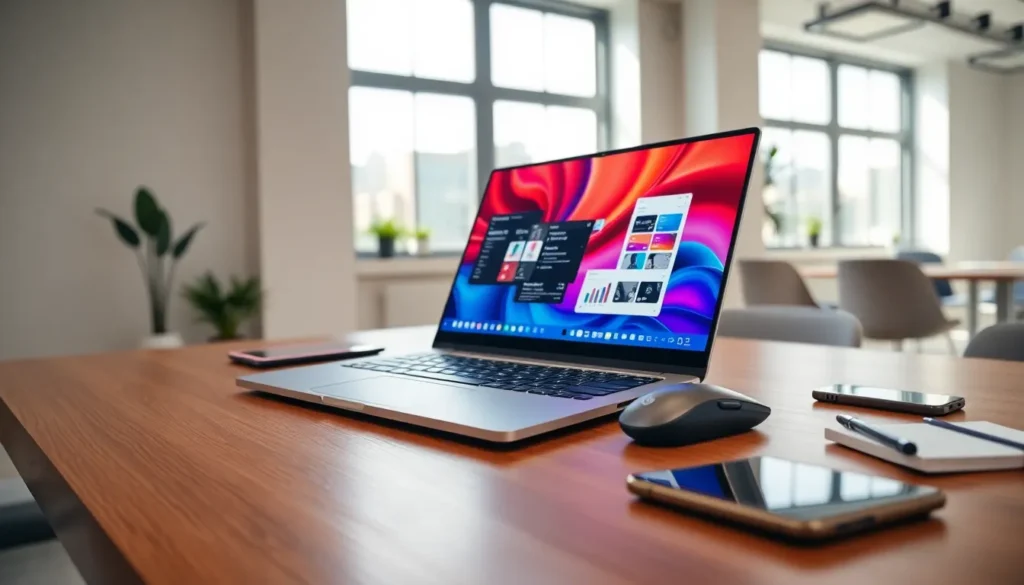Table of Contents
ToggleIn a world where losing your phone feels like losing a limb, mobile device tracking has become the superhero we didn’t know we needed. Imagine being able to locate that elusive device hiding under the couch cushions or, worse, in the hands of a tech-savvy thief. With mobile tracking, those heart-stopping moments of panic can turn into a calm, collected retrieval mission.
But it’s not just about finding lost phones. Mobile device tracking opens a treasure trove of possibilities, from keeping tabs on loved ones to optimizing business operations. It’s like having a GPS for your life, minus the annoying “recalculating” voice. Dive into the world of mobile device tracking and discover how this technology can bring peace of mind while adding a sprinkle of fun to your daily routine. Who knew tracking could be this exciting?
Overview of Mobile Device Tracking
Mobile device tracking utilizes GPS, Wi-Fi, and cellular data to determine a device’s location in real-time. This technology enables users to pinpoint the whereabouts of smartphones, tablets, and other mobile devices. In many cases, companies implement tracking to enhance security protocols and efficiently manage assets.
Various mobile tracking solutions cater to different needs. For instance, families use tracking applications to monitor their children’s locations, ensuring safety while promoting independence. Businesses leverage these tools to optimize logistics, reduce costs, and improve workforce management.
Data shows that over 75% of smartphone owners utilize location services for everyday tasks. Tracking applications provide features like route optimization, enabling users to find the quickest paths to destinations. Moreover, businesses gain insights from location data, allowing them to analyze consumer behavior and tailor offerings accordingly.
Privacy concerns surround mobile device tracking, leading to legislation that regulates data collection and usage. Consent from device owners is a crucial aspect, ensuring transparency and trust. Various laws, including the General Data Protection Regulation (GDPR), establish guidelines for responsible tracking practices.
Mobile device tracking enhances emergency response capabilities by providing accurate location information to first responders. Law enforcement agencies also rely on tracking technology to assist in criminal investigations. The broad range of applications illustrates the versatility and importance of this technology across multiple sectors.
How Mobile Device Tracking Works
Mobile device tracking relies on several technologies to establish a device’s location accurately. By utilizing GPS, Wi-Fi, and cellular data, these systems provide users with real-time updates about device movements.
GPS Technology
GPS technology uses a network of satellites to triangulate a device’s position. Satellites transmit signals to the device, enabling it to calculate its location based on signal distances. Accuracy often reaches within 5 to 10 meters under clear conditions. Most tracking applications leverage GPS for outdoor positioning, as it provides reliable and precise data. Users benefit from features like route mapping and navigation assistance, which enhance overall travel experiences.
Wi-Fi Triangulation
Wi-Fi triangulation determines a device’s location by analyzing nearby Wi-Fi signals. The system identifies multiple Wi-Fi access points, measuring signal strength to ascertain a device’s position. This method works well indoors where GPS may falter, especially in urban environments with dense buildings. Locations can be pinpointed within 20 to 30 meters. Businesses frequently use Wi-Fi triangulation to optimize customer engagement and enhance services based on location data.
Cell Tower Triangulation
Cell tower triangulation relies on signals from nearby cell towers to estimate a device’s location. When a device connects with multiple towers, it assesses signal strength and distances to determine its position. This technique typically covers larger areas and works effectively when GPS or Wi-Fi isn’t available. In urban settings, accuracy can fall within 500 meters, while rural areas might see less precision. Law enforcement agencies often utilize this method to track devices in investigations, underscoring its significance in safety and security.
Applications of Mobile Device Tracking
Mobile device tracking offers various applications across different sectors, providing both practical and strategic benefits.
Personal Safety
Mobile device tracking enhances personal safety for individuals and families. Parents frequently use tracking apps to monitor their children’s locations, ensuring they reach destinations safely. Emergency services also leverage this technology to quickly locate individuals in distress. Moreover, employers can track employees in hazardous work environments, improving their safety measures. This use of technology generates peace of mind for those concerned about their loved ones and enhances overall security in day-to-day activities.
Marketing and Analytics
In marketing, mobile device tracking plays a vital role in understanding consumer behavior. Businesses analyze location data to optimize advertising strategies, delivering targeted promotions based on user movements. Retailers also track foot traffic patterns to improve store layouts and product placements, ultimately boosting sales. Insights gained from mobile analytics inform product development and promotional campaigns, allowing companies to tailor offerings to customer preferences. Tracking in this context leads to more effective engagement and fosters higher customer satisfaction.
Fleet Management
Fleet management benefits significantly from mobile device tracking technologies. Companies optimize routes using real-time location data, thereby reducing fuel costs and improving delivery times. Managers can monitor driver behavior, enhancing safety and increasing efficiency. Real-time tracking allows for better coordination of logistics, minimizing downtime and maximizing productivity. Enhanced visibility into fleet operations leads to informed decision-making and ensures that resources are allocated effectively.
Privacy Concerns and Ethical Considerations
Mobile device tracking raises significant privacy concerns. Users often express worries about unauthorized access to their location data. Consent plays a critical role in ethical tracking practices, with regulations like the General Data Protection Regulation (GDPR) emphasizing transparency and user rights. Organizations must ensure they obtain explicit permission before tracking individuals.
Sensitive scenarios arise when tracking occurs without user awareness. It leads to potential misuse of data, especially when companies fail to secure personal information. Establishing clear policies helps mitigate these risks, promoting responsible use of tracking technologies.
Additionally, the potential for surveillance creates ethical dilemmas. Employers monitoring employees’ locations must balance business interests with staff privacy. Trust issues can emerge, affecting workplace culture if tracking feels invasive or unjustified.
Legislation adapts to address these privacy challenges. Countries worldwide are implementing stricter data protection laws to safeguard individual rights. Public awareness campaigns educate users about their rights related to mobile device tracking.
Tracking technologies significantly aid law enforcement and emergency services. Rapid access to location data improves response times in critical situations. Without proper oversight, however, such capabilities could infringe on personal freedoms.
Societal perceptions of tracking technologies impact their acceptability. Trust in technology’s ability to enhance safety exists, but skepticism about its privacy implications persists. Discussions surrounding ethical tracking emphasize the need for a balanced approach, maintaining user safety while respecting privacy rights.
Future Trends in Mobile Device Tracking
Emerging technologies will reshape mobile device tracking in various sectors. Enhanced algorithms are making real-time tracking more accurate, significantly benefiting industries like logistics. Predictive analytics, used with tracking data, allows companies to foresee consumer behavior trends. Privacy-focused applications are likely to draw more attention amidst growing concerns over data security.
Artificial intelligence (AI) is transforming the ability to analyze vast amounts of location data. AI-powered tools can identify patterns and provide insights into user behavior, driving smarter decision-making. Additionally, the integration of blockchain technology may offer more secure methods for managing permission and access related to location data.
Wearable technology is expanding the scope of mobile tracking. Smartwatches and fitness trackers now feature GPS capabilities, making health and safety monitoring seamless. Families increasingly adopt these devices to keep track of elderly members, enhancing personal safety.
Regulatory frameworks continue to evolve alongside technological advancements. Governments are actively updating policies to ensure responsible tracking practices. For example, compliance with regulations like the General Data Protection Regulation (GDPR) will likely become a core requirement for app developers.
Cross-platform integration is another significant trend. Businesses may benefit from tools that connect different tracking systems, enabling a unified approach to data management. This integration fosters collaboration and leads to enhanced operational efficiency across various domains.
Lastly, the rise of augmented reality (AR) in mobile applications can create engaging navigation experiences. AR applications that combine location data with real-world environments promise innovative user interactions. Such advancements not only enhance user engagement but also promote greater acceptance among consumers.
Mobile device tracking is reshaping how individuals and businesses navigate their daily lives. Its ability to provide safety and efficiency is undeniable. As technology evolves so do the applications and benefits of tracking systems.
While privacy concerns remain a significant topic of discussion it’s clear that responsible practices can enhance user trust. The future promises even more innovations that will refine tracking capabilities and improve user experiences.
By balancing safety and privacy mobile device tracking can continue to play a crucial role in modern society. Embracing these technologies responsibly will lead to greater peace of mind for users everywhere.




